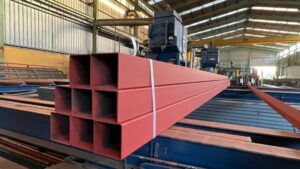
While the US steel industry has embraced digital technology to increase efficiencies in production, overall the buying and selling of steel remains comparatively analog. With this in mind, Felux, a Cleveland startup, on Monday launched an online marketplace to buy and sell steel in an effort to increase efficiency, transparency and accuracy in the domestic market.
“In the manufacturing space especially, people are still doing what most other industries already shifted to digital,” John Camenisch, managing partner of Felux, told S&P Global Platts in a recent interview at the company’s Cleveland office. “It’s not the most efficient way for a buyer or seller to spend their time.”
With Felux, users can post and view material for sale, post a request for quotation, receive quotes from across the country, compare them on price and quality, then negotiate a deal with just a few clicks.
Camenisch said the site’s ease of use was a major priority while the team was building out the system and is one of its best selling points.
“It’s been a tech-phobic industry for a while now and we knew with a lot of confidence that if we created something that was in any way, shape or form complicated to use, there are a lot of users out there that would just give up right away,” he said.
While there have been past attempts to shift steel sales online, one of the challenges in creating a robust marketplace online is the amount of data that is required to transact steel, Camenisch said.
“If you think about buying shoes on Amazon, you’re providing a credit card number and an address, but in the steel world to transact, just on the logistics side, you need to know things like shipping hours, receiving hours, is there rail access, what kind of truck capacity a facility has,” he said. “Right away we knew that was something we were going to have to overcome because you can’t have people writing books every time they want to transact.”
Camenisch and fellow Felux managing partner Chris Day said they feel confident that their system will meet the needs of the industry because they and the Felux team are coming from the physical side of the industry.
Felux is the vision of its founder Todd Leebow, CEO of Majestic Steel USA, one of the largest US service centers. Felux was spun out in November 2018, but prior to that, its technology was incubated at Majestic, where Camenisch and Day worked in the company’s analytics and innovation business unit and were responsible for capturing, analyzing and visualizing data company-wide. Felux operates as a completely separate entity from Majestic.
To start, Felux is focusing on creating a marketplace for flat-rolled products, including carbon steel, stainless steel and aluminum. There are plans to expand into long products following the launch of the site, company executives said. It is free to create an account and the company collects a fee of less than 1% from sellers that transact business there.
The network is limited to users authenticated and verified by Felux to ensure that everyone on the site is a legitimate buyer and seller, Camenisch said. Users can store logistics information and create profiles for their regular buys in order to search the site and close orders quickly, he added. Users can also negotiate pricing through the site and receive text and email alerts to monitor their interactions.
“We thought that it was really important that whatever we build feels very familiar to people and allows them to do what they do today, so negotiation is a huge part of the space,” he said.
And given the competitive nature of the steel industry, Felux gives users complete control over how public anything they post will be.
“There are a lot of situations where people are trying to time the market and do hedge buying and things along those lines,” Camenisch said. “If you’re a service center trying to do a big hedge buy, you don’t want the other service centers to see that you placed this massive RFQ out there.”
With the steel industry struggling to attract younger talent, going digital has become crucial, Day said.
“You can feel a movement finally happening in our place,” he added. “I feel like if we would have tried to have this conversation even five years ago, I think people would have been less likely to take the time.”
— Justine Coyne




